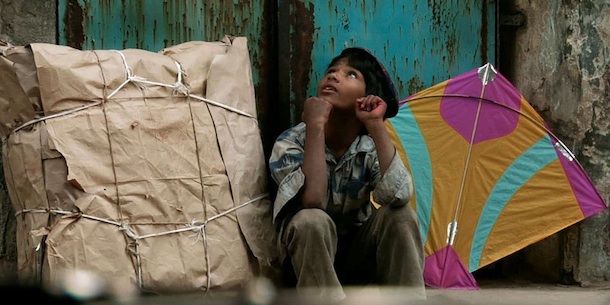
Hamid (Hamid Shaikh) looks to the skies in poignant Indian family drama (photo courtesy Khushi Films)
PATANG (Prashant Bhargava, 2011)
Cinema Village
22 East 12th St. between University Pl. & Fifth Ave.
Opens Friday, June 15
212-924-3363
www.cinemavillage.com
www.patang.tv
 Born and raised in Chicago, Prashant Bhargava returns to his cultural heritage in his debut feature film, the tender and moving Patang. Set during the traditional Uttarayan kite festival held every January 14 in India, the film follows a family celebrating the event in their home in Ahmedabad, where they are joined by Jayesh (Mukund Shukla) for the first time in five years. A successful businessman who moved to Delhi, Jayesh has brought his daughter, Priya (Sugandha Garg), with him, a young woman whose burgeoning sexuality has Jayesh playing the overprotective father. Although most of the family is happy to see him, he finds that he is still at odds with his nephew Chakku (Nawazuddin Siddiqui), who blames Jayesh for his father’s death. Chakku also resents his uncle for having left the family home for the big city. While Jayesh tries to convince his sister-in-law, Sudha (Seema Biswas), and mother (Pannaben Soni), Ba, that Delhi would be good for them as well, Priya flirts with Bobby (Aakash Maherya), a local man she met in an electronics store, and Chakku guides a small group of young boys, particularly Hamid (Hamid Shaikh), through some of the harder sides of life. Bhargava wrote, directed, and edited Patang and also operated one of two handheld HD cameras, along with cinematographer Shanker Raman, giving the film a documentary-like feel that is enhanced by a cast that consists primarily of nonactors in heavily improvised scenes based on the script. The neorealist film pits the traditional against the new, old against young, and rich against poor as the night sky ultimately comes alive with colorful kites, fireworks, and glowing lanterns called tukkals. The film also features an evocative score by Mario Grigorov and songs by Pankaj Awasthi and others that continue the subtle exploration of India’s past, present, and future as seen through the eyes of one tight-knit family.
Born and raised in Chicago, Prashant Bhargava returns to his cultural heritage in his debut feature film, the tender and moving Patang. Set during the traditional Uttarayan kite festival held every January 14 in India, the film follows a family celebrating the event in their home in Ahmedabad, where they are joined by Jayesh (Mukund Shukla) for the first time in five years. A successful businessman who moved to Delhi, Jayesh has brought his daughter, Priya (Sugandha Garg), with him, a young woman whose burgeoning sexuality has Jayesh playing the overprotective father. Although most of the family is happy to see him, he finds that he is still at odds with his nephew Chakku (Nawazuddin Siddiqui), who blames Jayesh for his father’s death. Chakku also resents his uncle for having left the family home for the big city. While Jayesh tries to convince his sister-in-law, Sudha (Seema Biswas), and mother (Pannaben Soni), Ba, that Delhi would be good for them as well, Priya flirts with Bobby (Aakash Maherya), a local man she met in an electronics store, and Chakku guides a small group of young boys, particularly Hamid (Hamid Shaikh), through some of the harder sides of life. Bhargava wrote, directed, and edited Patang and also operated one of two handheld HD cameras, along with cinematographer Shanker Raman, giving the film a documentary-like feel that is enhanced by a cast that consists primarily of nonactors in heavily improvised scenes based on the script. The neorealist film pits the traditional against the new, old against young, and rich against poor as the night sky ultimately comes alive with colorful kites, fireworks, and glowing lanterns called tukkals. The film also features an evocative score by Mario Grigorov and songs by Pankaj Awasthi and others that continue the subtle exploration of India’s past, present, and future as seen through the eyes of one tight-knit family.